Gairdner J. History of the Life and Reign of Richard the Third: To which is Added the Story of Perkin Warbeck from Original Documents
Подождите немного. Документ загружается.

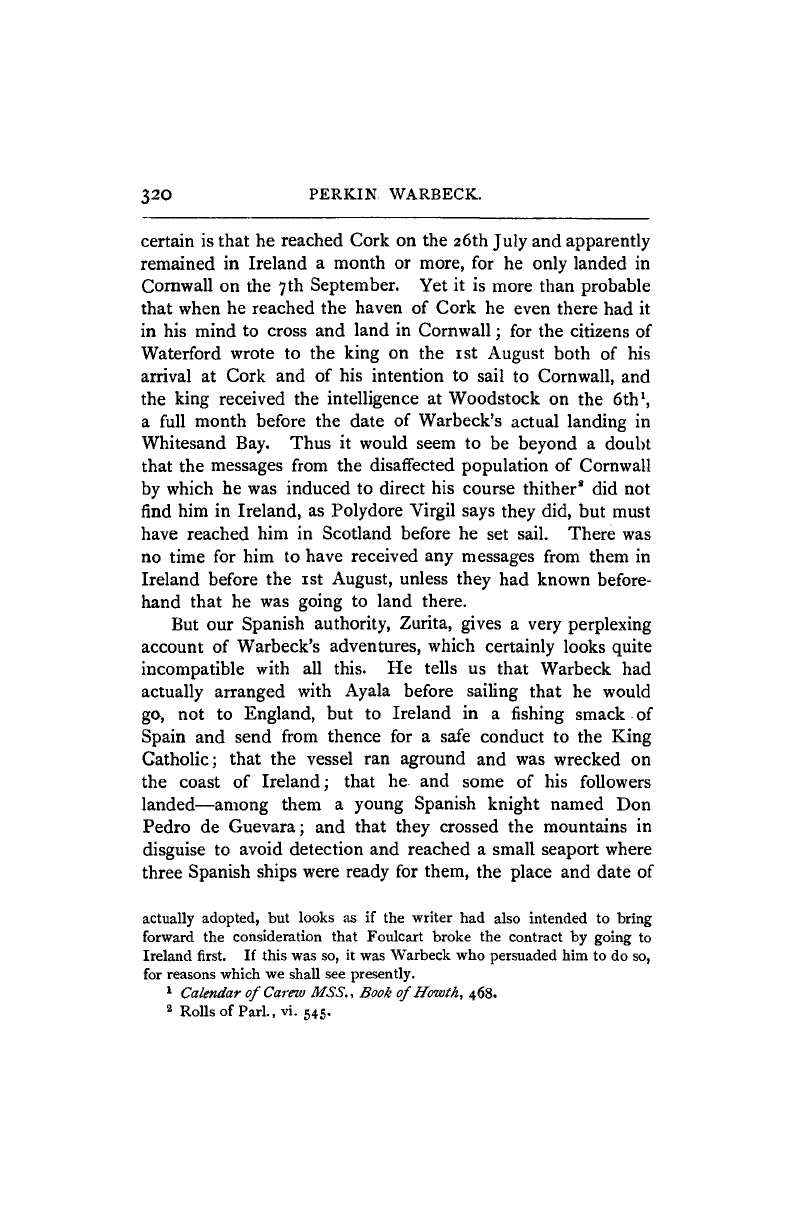
32O PERKIN WARBECK.
certain is that he reached Cork on the 26th July and apparently
remained in Ireland a month or more, for he only landed in
Cornwall on the 7 th September. Yet it is more than probable
that when he reached the haven of Cork he even there had it
in his mind to cross and land in Cornwall; for the citizens of
Waterford wrote to the king on the 1st August both of his
arrival at Cork and of his intention to sail to Cornwall, and
the king received the intelligence at Woodstock on the 6th
1
,
a full month before the date of Warbeck's actual landing in
Whitesand Bay. Thus it would seem to be beyond a doubt
that the messages from the disaffected population of Cornwall
by which he was induced to direct his course thither
8
did not
find him in Ireland, as Polydore Virgil says they did, but must
have reached him in Scotland before he set sail. There was
no time for him to have received any messages from them in
Ireland before the 1st August, unless they had known before-
hand that he was going to land there.
But our Spanish authority, Zurita, gives a very perplexing
account of Warbeck's adventures, which certainly looks quite
incompatible with all this. He tells us that Warbeck had
actually arranged with Ayala before sailing that he would
go,
not to England, but to Ireland in a fishing smack of
Spain and send from thence for a safe conduct to the King
Catholic; that the vessel ran aground and was wrecked on
the coast of Ireland; that he and some of his followers
landed—among them a young Spanish knight named Don
Pedro de Guevara; and that they crossed the mountains in
disguise to avoid detection and reached a small seaport where
three Spanish ships were ready for them, the place and date of
actually adopted, but looks as if the writer had also intended to bring
forward the consideration that Foulcart broke the contract by going to
Ireland first. If this was so, it was Warbeck who persuaded him to do so,
for reasons which we shall see presently.
» Calendar of Carew MSS., Book of' Howth, 468.
2
Rolls of Parl., vi. 545.
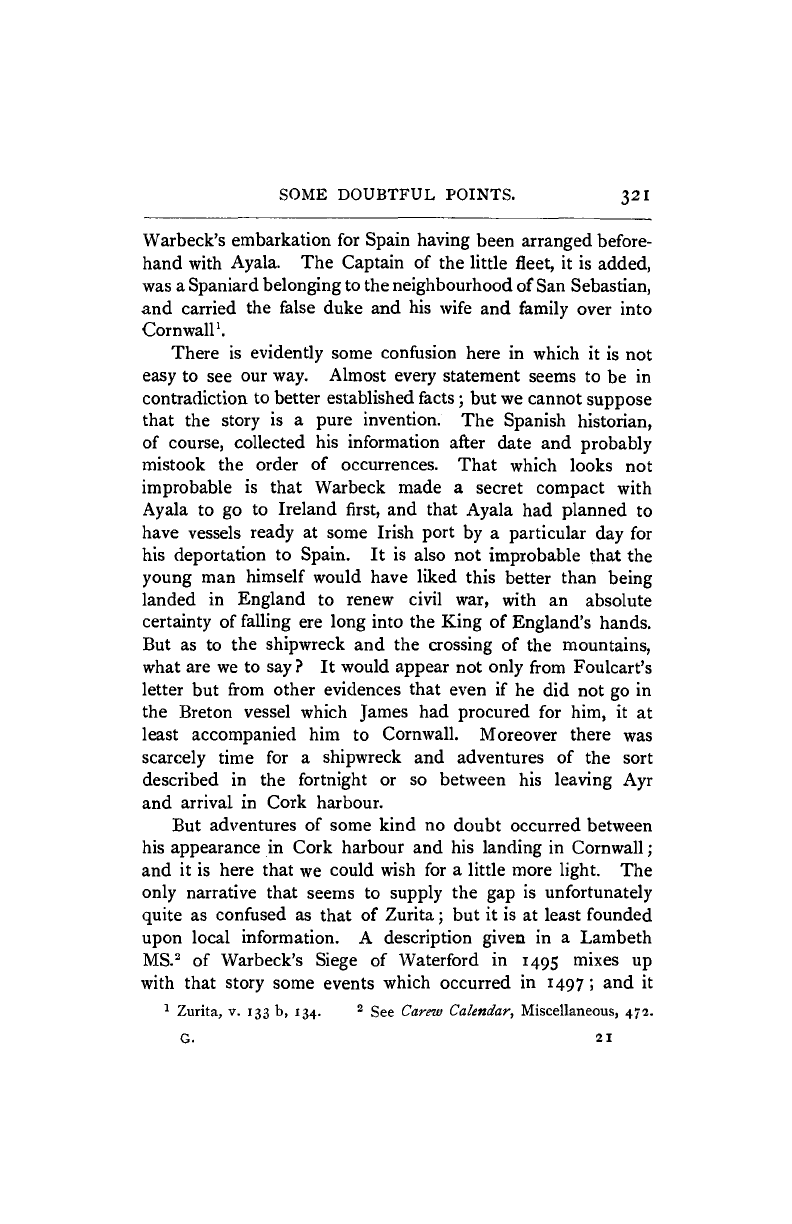
SOME DOUBTFUL POINTS. 321
Warbeck's embarkation for Spain having been arranged before-
hand with Ayala. The Captain of the little fleet, it is added,
was a Spaniard belonging to the neighbourhood of
San
Sebastian,
and carried the false duke and his wife and family over into
Cornwall
1
.
There is evidently some confusion here in which it is not
easy to see our way. Almost every statement seems to be in
contradiction to better established facts; but we cannot suppose
that the story is a pure invention. The Spanish historian,
of course, collected his information after date and probably
mistook the order of occurrences. That which looks not
improbable is that Warbeck made a secret compact with
Ayala to go to Ireland first, and that Ayala had planned to
have vessels ready at some Irish port by a particular day for
his deportation to Spain. It is also not improbable that the
young man himself would have liked this better than being
landed in England to renew civil war, with an absolute
certainty of falling ere long into the King of England's hands.
But as to the shipwreck and the crossing of the mountains,
what are we to say
?
It would appear not only from Foulcart's
letter but from other evidences that even if he did not go in
the Breton vessel which James had procured for him, it at
least accompanied him to Cornwall. Moreover there was
scarcely time for a shipwreck and adventures of the sort
described in the fortnight or so between his leaving Ayr
and arrival in Cork harbour.
But adventures of some kind no doubt occurred between
his appearance in Cork harbour and his landing in Cornwall;
and it is here that we could wish for a little more light. The
only narrative that seems to supply the gap is unfortunately
quite as confused as that of Zurita; but it is at least founded
upon local information. A description given in a Lambeth
MS.
2
of Warbeck's Siege of Waterford in 1495 mixes up
with that story some events which occurred in 1497 ; and it
1
Zurita, v. 133 b, 134.
2
See Carew Calendar, Miscellaneous, 472.
G. 21
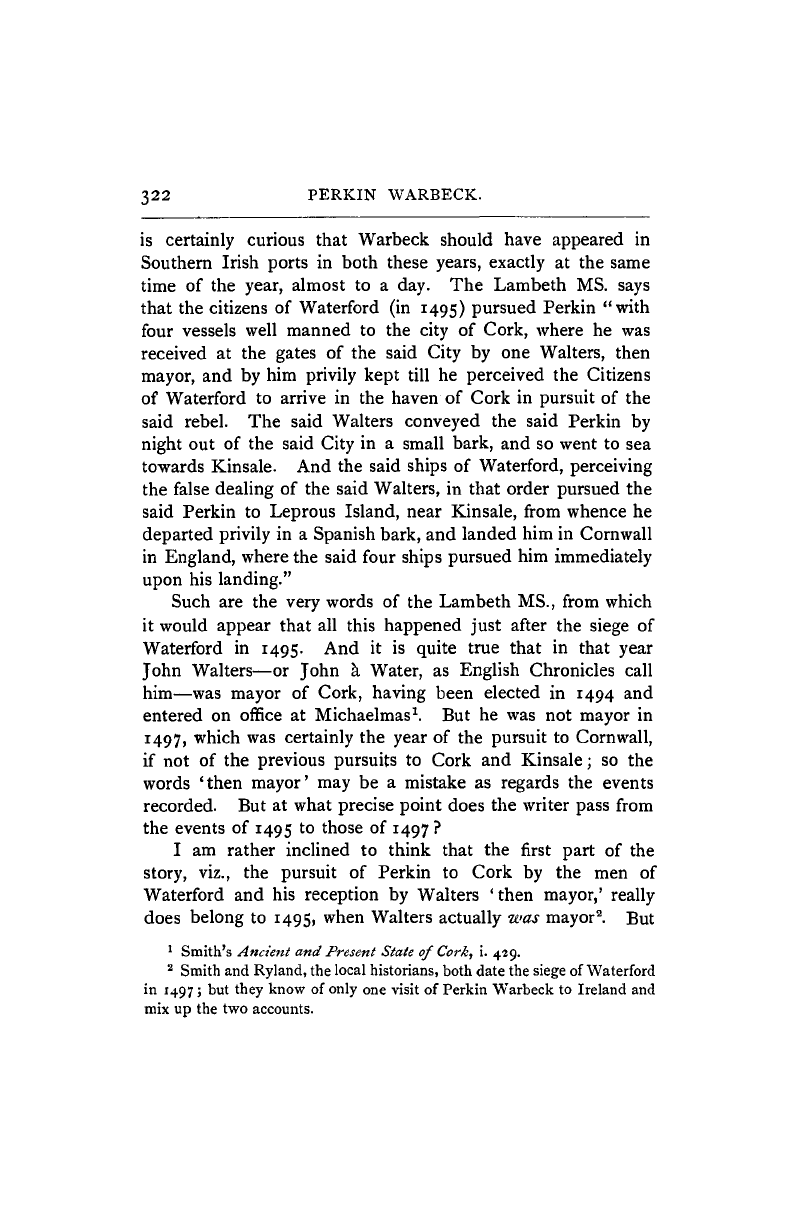
322 PERK.IN WARBECK.
is certainly curious that Warbeck should have appeared in
Southern Irish ports in both these years, exactly at the same
time of the year, almost to a day. The Lambeth MS. says
that the citizens of Waterford (in 1495) pursued Perkin "with
four vessels well manned to the city of Cork, where he was
received at the gates of the said City by one Walters, then
mayor, and by him privily kept till he perceived the Citizens
of Waterford to arrive in the haven of Cork in pursuit of the
said rebel. The said Walters conveyed the said Perkin by
night out of the said City in a small bark, and so went to sea
towards Kinsale. And the said ships of Waterford, perceiving
the false dealing of the said Walters, in that order pursued the
said Perkin to Leprous Island, near Kinsale, from whence he
departed privily in a Spanish bark, and landed him in Cornwall
in England, where the said four ships pursued him immediately
upon his landing."
Such are the very words of the Lambeth MS., from which
it would appear that all this happened just after the siege of
Waterford in 1495. And it is quite true that in that year
John Walters—or John a Water, as English Chronicles call
him—was mayor of Cork, having been elected in 1494 and
entered on office at Michaelmas
1
. But he was not mayor in
1497,
which was certainly the year of the pursuit to Cornwall,
if not of the previous pursuits to Cork and Kinsale; so the
words 'then mayor' may be a mistake as regards the events
recorded. But at what precise point does the writer pass from
the events of 1495 to those of 1497 ?
I am rather inclined to think that the first part of the
story, viz., the pursuit of Perkin to Cork by the men of
Waterford and his reception by Walters ' then mayor,' really
does belong to 1495, when Walters actually was mayor
2
. But
1
Smith's Ancient and Present State of Cork, i. 429.
2
Smith and Ryland, the local historians, both date the siege of Waterford
in 1497; but they know of only one visit of Perkin Warbeck to Ireland and
mix up the two accounts.
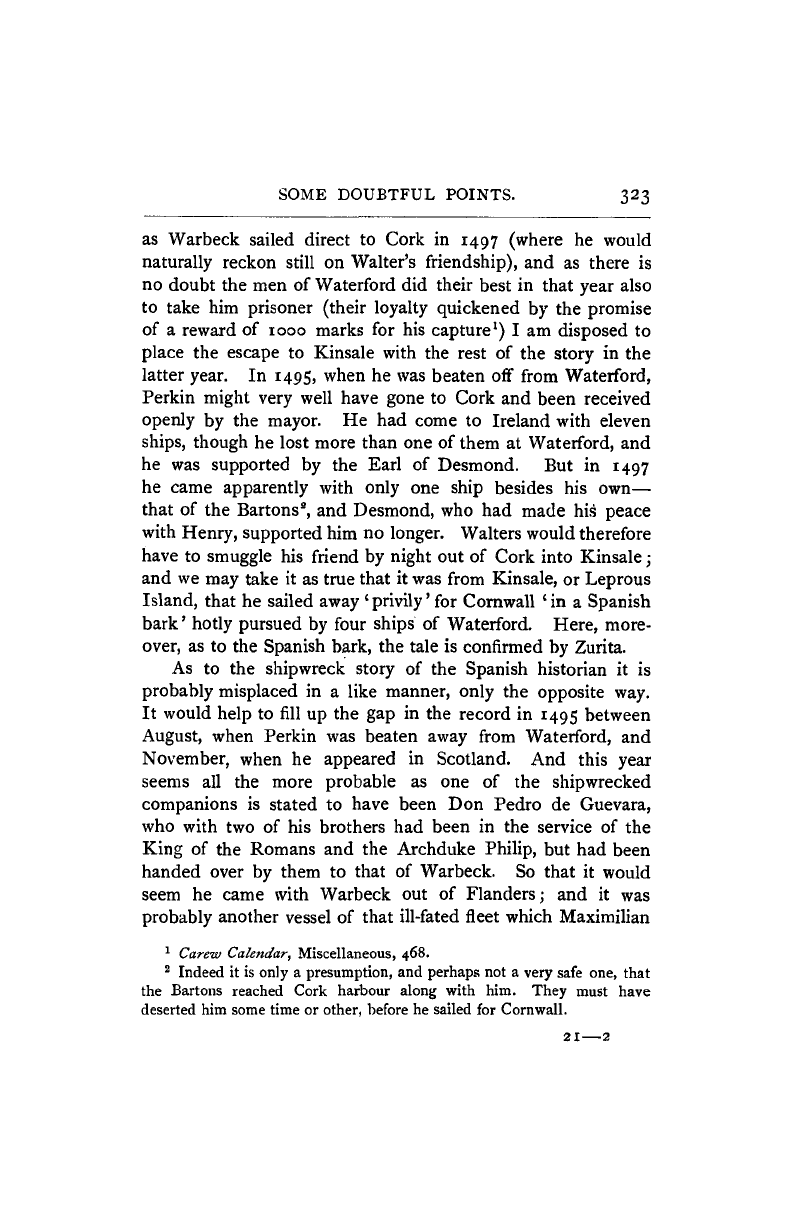
SOME DOUBTFUL POINTS. 323
as Warbeck sailed direct to Cork in 1497 (where he would
naturally reckon still on Walter's friendship), and as there is
no doubt the men of Waterford did their best in that year also
to take him prisoner (their loyalty quickened by the promise
of a reward of 1000 marks for his capture
1
) I am disposed to
place the escape to Kinsale with the rest of the story in the
latter year. In 1495, when he was beaten off from Waterford,
Perkin might very well have gone to Cork and been received
openly by the mayor. He had come to Ireland with eleven
ships,
though he lost more than one of them at Waterford, and
he was supported by the Earl of Desmond. But in 1497
he came apparently with only one ship besides his own—
that of the Bartons
2
, and Desmond, who had made his peace
with Henry, supported him no longer. Walters would therefore
have to smuggle his friend by night out of Cork into Kinsale;
and we may take it as true that it was from Kinsale, or Leprous
Island, that he sailed away ' privily' for Cornwall ' in a Spanish
bark' hotly pursued by four ships of Waterford. Here, more-
over, as to the Spanish bark, the tale is confirmed by Zurita.
As to the shipwreck story of the Spanish historian it is
probably misplaced in a like manner, only the opposite way.
It would help to fill up the gap in the record in 1495 between
August, when Perkin was beaten away from Waterford, and
November, when he appeared in Scotland. And this year
seems all the more probable as one of the shipwrecked
companions is stated to have been Don Pedro de Guevara,
who with two of his brothers had been in the service of the
King of the Romans and the Archduke Philip, but had been
handed over by them to that of Warbeck. So that it would
seem he came with Warbeck out of Flanders; and it was
probably another vessel of that ill-fated fleet which Maximilian
1
Carew Calendar, Miscellaneous, 468.
2
Indeed it is only a presumption, and perhaps not a very safe one, that
the Bartons reached Cork harbour along with him. They must have
deserted him some time or other, before he sailed for Cornwall.
21—2
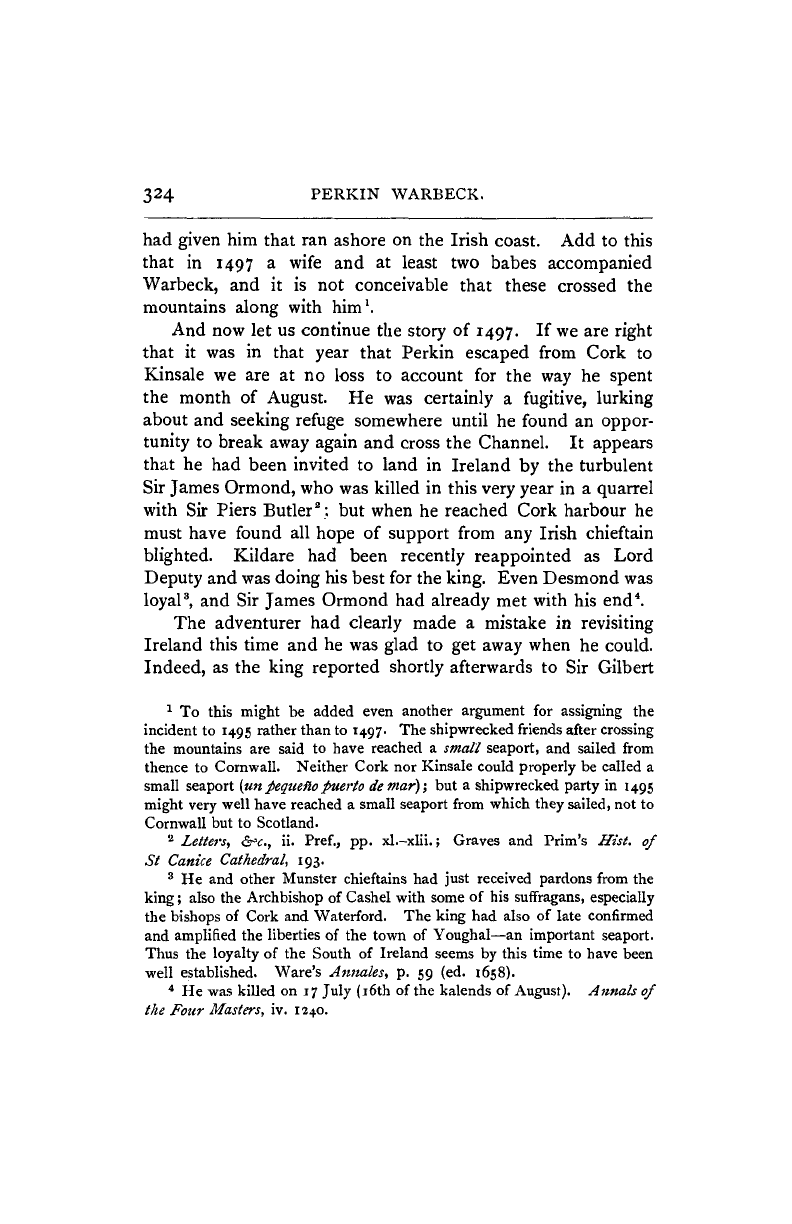
324 PERKIN WARBECK.
had given him that ran ashore on the Irish coast. Add to this
that in 1497 a wife and at least two babes accompanied
Warbeck, and it is not conceivable that these crossed the
mountains along with him'.
And now let us continue the story of 1497. If we are right
that it was in that year that Perkin escaped from Cork to
Kinsale we are at no loss to account for the way he spent
the month of August. He was certainly a fugitive, lurking
about and seeking refuge somewhere until he found an oppor-
tunity to break away again and cross the Channel. It appears
that he had been invited to land in Ireland by the turbulent
Sir James Ormond, who was killed in this very year in a quarrel
with Sir Piers Butler
2
; but when he reached Cork harbour he
must have found all hope of support from any Irish chieftain
blighted. Kildare had been recently reappointed as Lord
Deputy and was doing his best for the king. Even Desmond was
loyal
3
, and Sir James Ormond had already met with his end
4
.
The adventurer had clearly made a mistake in revisiting
Ireland this time and he was glad to get away when he could.
Indeed, as the king reported shortly afterwards to Sir Gilbert
1
To this might be added even another argument for assigning the
incident to 1495 rather than to 1497- The shipwrecked friends after crossing
the mountains are said to have reached a small seaport, and sailed from
thence to Cornwall. Neither Cork nor Kinsale could properly be called a
small seaport (un
pequefto
puerfo demar); but a shipwrecked party in 1495
might very well have reached a small seaport from which they sailed, not to
Cornwall but to Scotland.
2
Letters, &>c, ii.
Pref.,
pp. xl.-xlii.; Graves and Prim's Hist, of
St Canice Cathedral, 193.
3
He and other Munster chieftains had just received pardons from the
king; also the Archbishop of Cashel with some of his suffragans, especially
the bishops of Cork and Waterford. The king had also of late confirmed
and amplified the liberties of the town of Youghal—an important seaport.
Thus the loyalty of the South of Ireland seems by this time to have been
well established. Ware's Annales, p. 59 (ed. 1658).
4
He was killed on 17 July (16th of the kalends of August). Annals of
the Four Masters, iv. 1240.
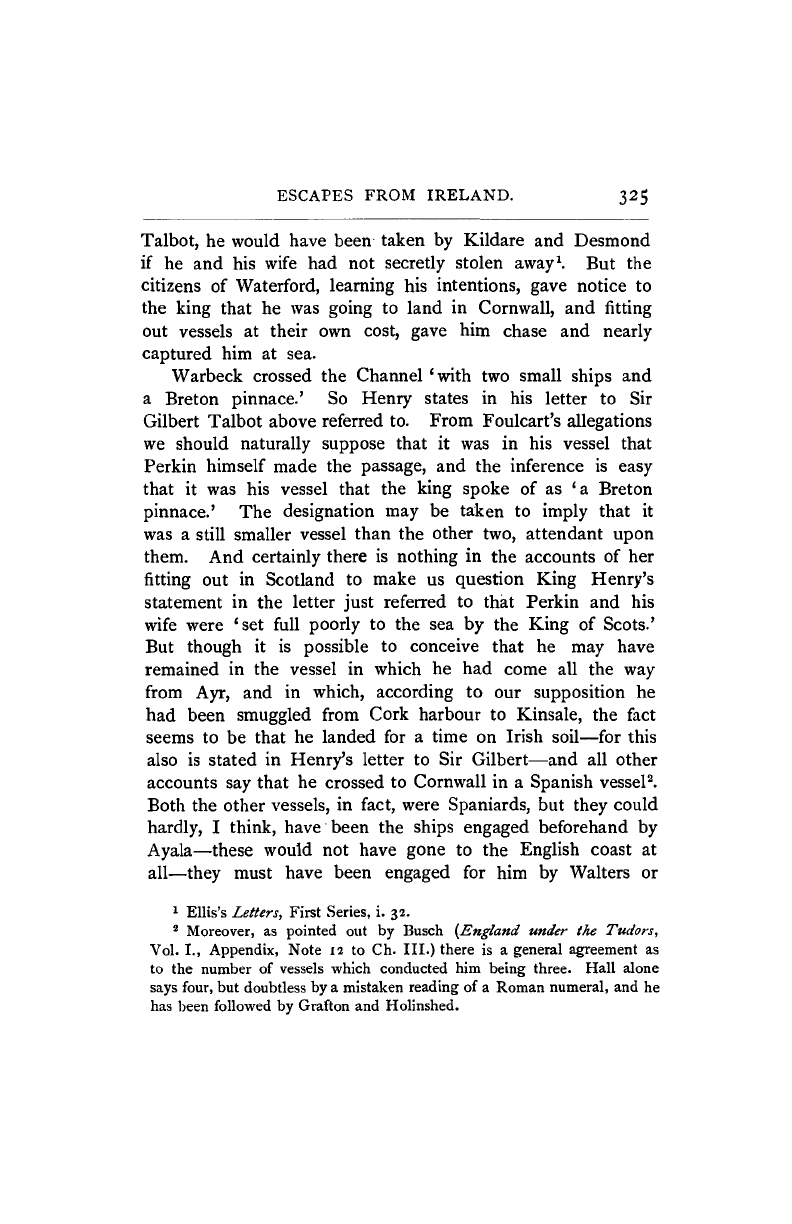
ESCAPES FROM IRELAND. 32$
Talbot, he would have been taken by Kildare and Desmond
if he and his wife had not secretly stolen away
1
. But the
citizens of Waterford, learning his intentions, gave notice to
the king that he was going to land in Cornwall, and fitting
out vessels at their own cost, gave him chase and nearly
captured him at sea.
Warbeck crossed the Channel 'with two small ships and
a Breton pinnace.' So Henry states in his letter to Sir
Gilbert Talbot above referred to. From Foulcart's allegations
we should naturally suppose that it was in his vessel that
Perkin himself made the passage, and the inference is easy
that it was his vessel that the king spoke of as 'a Breton
pinnace.' The designation may be taken to imply that it
was a still smaller vessel than the other two, attendant upon
them. And certainly there is nothing in the accounts of her
fitting out in Scotland to make us question King Henry's
statement in the letter just referred to that Perkin and his
wife were 'set full poorly to the sea by the King of Scots.'
But though it is possible to conceive that he may have
remained in the vessel in which he had come all the way
from Ayr, and in which, according to our supposition he
had been smuggled from Cork harbour to Kinsale, the fact
seems to be that he landed for a time on Irish soil—for this
also is stated in Henry's letter to Sir Gilbert—and all other
accounts say that he crossed to Cornwall in a Spanish vessel
2
.
Both the other vessels, in fact, were Spaniards, but they could
hardly, I think, have been the ships engaged beforehand by
Ayala—these would not have gone to the English coast at
all—they must have been engaged for him by Walters or
1
Ellis's Letters, First Series, i. 32.
2
Moreover, as pointed out by Busch (England under the Tudors,
Vol. I., Appendix, Note 12 to Ch. III.) there is a general agreement as
to the number of vessels which conducted him being three. Hall alone
says four, but doubtless by a mistaken reading of a Roman numeral, and he
has been followed by Grafton and Holinshed.
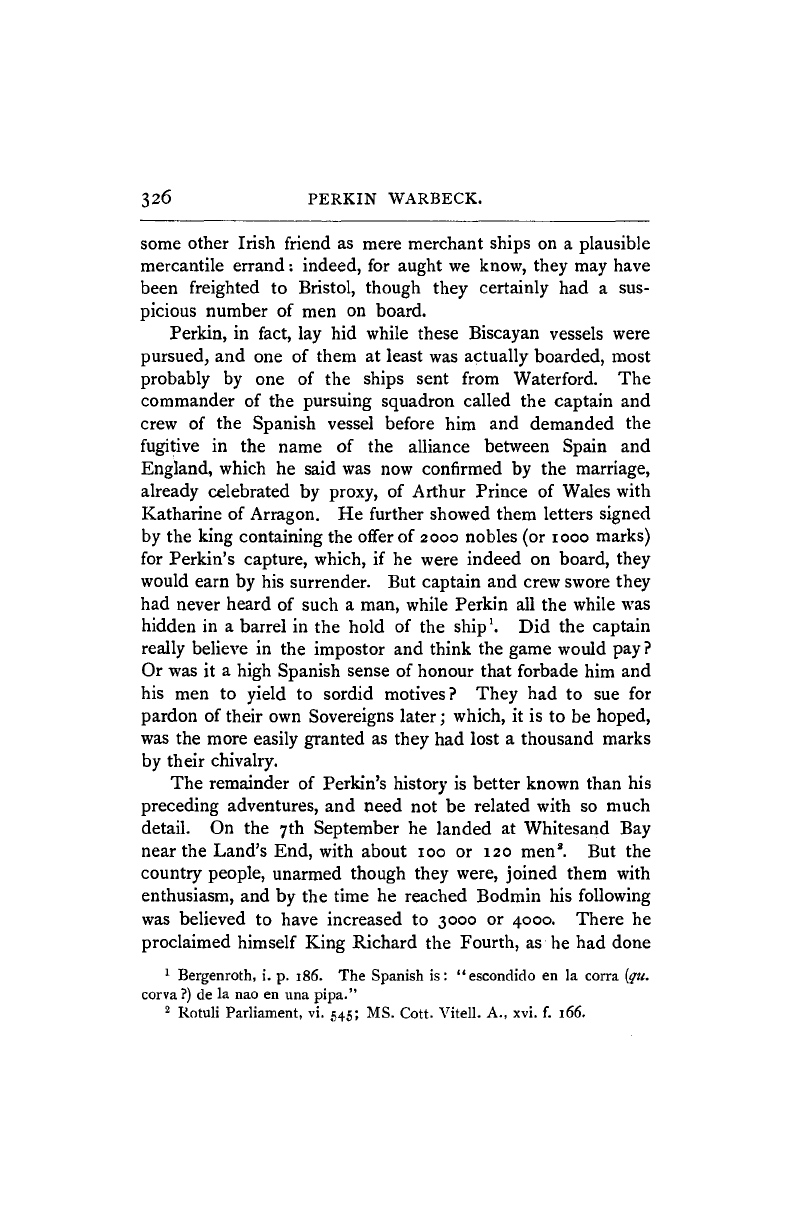
326 PERKIN WARBECK.
some other Irish friend as mere merchant ships on a plausible
mercantile errand
:
indeed, for aught we know, they may have
been freighted to Bristol, though they certainly had a sus-
picious number of men on board.
Perkin, in fact, lay hid while these Biscayan vessels were
pursued, and one of them at least was actually boarded, most
probably by one of the ships sent from Waterford. The
commander of the pursuing squadron called the captain and
crew of the Spanish vessel before him and demanded the
fugitive in the name of the alliance between Spain and
England, which he said was now confirmed by the marriage,
already celebrated by proxy, of Arthur Prince of Wales with
Katharine of Arragon. He further showed them letters signed
by the king containing the offer of 2000 nobles (or 1000 marks)
for Perkin's capture, which, if he were indeed on board, they
would earn by his surrender. But captain and crew swore they
had never heard of such a man, while Perkin all the while was
hidden in a barrel in the hold of the ship
1
. Did the captain
really believe in the impostor and think the game would pay
?
Or was it a high Spanish sense of honour that forbade him and
his men to yield to sordid motives? They had to sue for
pardon of their own Sovereigns later; which, it is to be hoped,
was the more easily granted as they had lost a thousand marks
by their chivalry.
The remainder of Perkin's history is better known than his
preceding adventures, and need not be related with so much
detail. On the 7th September he landed at Whitesand Bay
near the Land's End, with about 100 or 120 men*. But the
country people, unarmed though they were, joined them with
enthusiasm, and by the time he reached Bodmin his following
was believed to have increased to 3000 or 4000. There he
proclaimed himself King Richard the Fourth, as he had done
1
Bergenroth, i. p. 186. The Spanish is: "escondido en la corra (fit.
corva?) de la nao en una pipa."
2
Rotuli Parliament, vi. 545;
MS.
Cott. Vitell. A., xvi. f. 166.
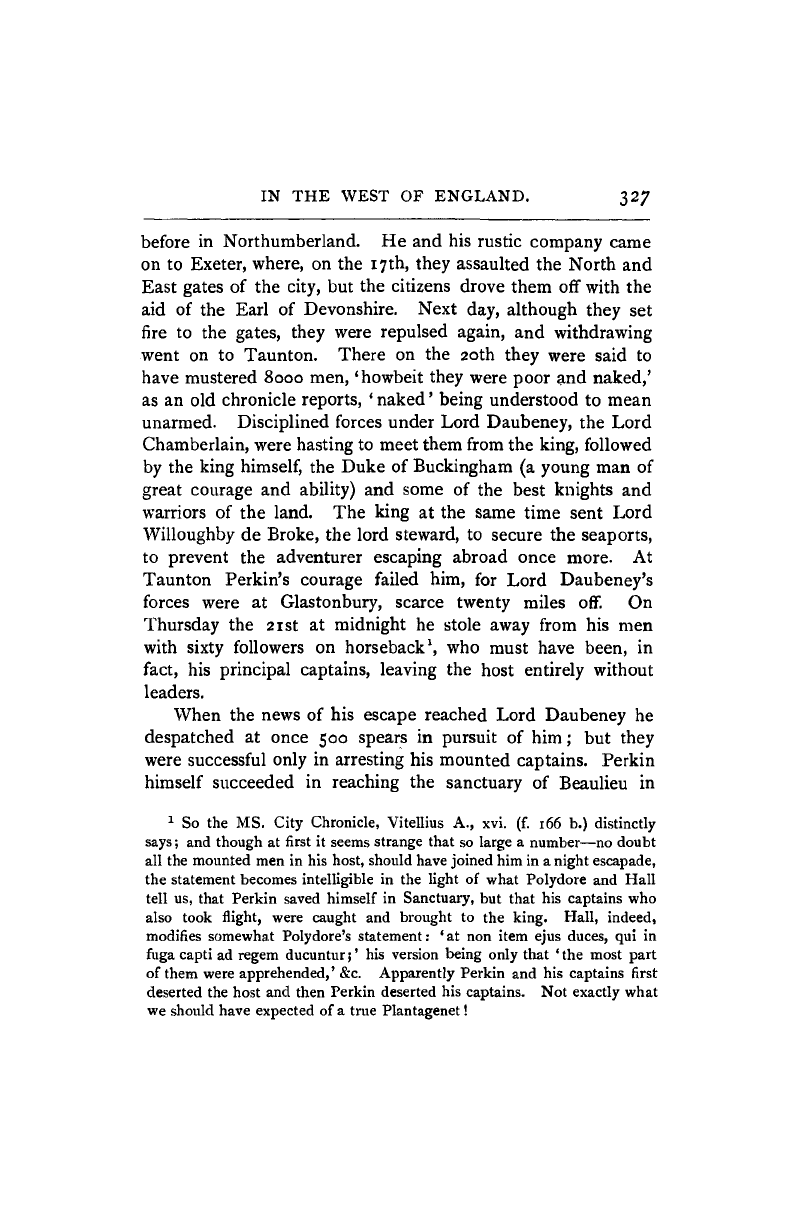
IN THE WEST OF ENGLAND. 327
before in Northumberland. He and his rustic company came
on to Exeter, where, on the 17 th, they assaulted the North and
East gates of the city, but the citizens drove them off with the
aid of the Earl of Devonshire. Next day, although they set
fire to the gates, they were repulsed again, and withdrawing
went on to Taunton. There on the 20th they were said to
have mustered 8000 men, 'howbeit they were poor and naked,'
as an old chronicle reports, ' naked' being understood to mean
unarmed. Disciplined forces under Lord Daubeney, the Lord
Chamberlain, were hasting to meet them from the king, followed
by the king
himself,
the Duke of Buckingham (a young man of
great courage and ability) and some of the best knights and
warriors of the land. The king at the same time sent Lord
Willoughby de Broke, the lord steward, to secure the seaports,
to prevent the adventurer escaping abroad once more. At
Taunton Perkin's courage failed him, for Lord Daubeney's
forces were at Glastonbury, scarce twenty miles off. On
Thursday the 21st at midnight he stole away from his men
with sixty followers on horseback
1
, who must have been, in
fact, his principal captains, leaving the host entirely without
leaders.
When the news of his escape reached Lord Daubeney he
despatched at once 500 spears in pursuit of him; but they
were successful only in arresting his mounted captains. Perkin
himself succeeded in reaching the sanctuary of Beaulieu in
1
So the MS. City Chronicle, Vitellius A., xvi. (f. 166 b.) distinctly
says;
and though at first it seems strange that so large a number—no doubt
all the mounted men in his host, should have joined him in a night escapade,
the statement becomes intelligible in the light of what Polydore and Hall
tell us, that Perkin saved himself in Sanctuary, but that his captains who
also took flight, were caught and brought to the king. Hall, indeed,
modifies somewhat Polydore's statement: 'at non item ejus duces, qui in
fuga capti ad regem ducuntur;' his version being only that ' the most part
of them were apprehended,' &c. Apparently Perkin and his captains first
deserted the host and then Perkin deserted his captains. Not exactly what
we should have expected of a true Plantagenet!
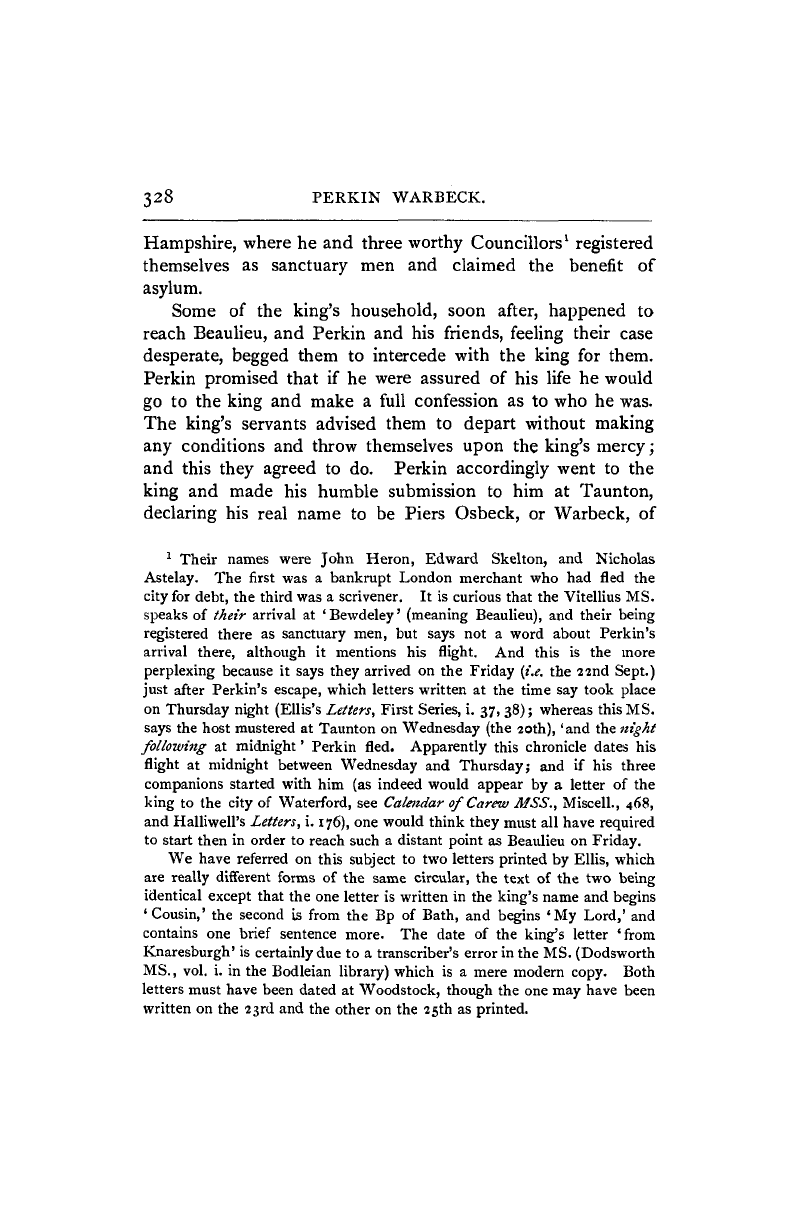
328 PERKIN WARBECK.
Hampshire, where he and three worthy Councillors' registered
themselves as sanctuary men and claimed the benefit of
asylum.
Some of the king's household, soon after, happened to
reach Beaulieu, and Perkin and his friends, feeling their case
desperate, begged them to intercede with the king for them.
Perkin promised that if he were assured of his life he would
go to the king and make a full confession as to who he was.
The king's servants advised them to depart without making
any conditions and throw themselves upon the king's mercy;
and this they agreed to do. Perkin accordingly went to the
king and made his humble submission to him at Taunton,
declaring his real name to be Piers Osbeck, or Warbeck, of
1
Their names were John Heron, Edward Skelton, and Nicholas
Astelay. The first was a bankrupt London merchant who had fled the
city for debt, the third was a scrivener. It is curious that the Vitellius MS.
speaks of their arrival at 'Bewdeley' (meaning Beaulieu), and their being
registered there as sanctuary men, but says not a word about Perkin's
arrival there, although it mentions his flight. And this is the more
perplexing because it says they arrived on the Friday (i.e. the 22nd Sept.)
just after Perkin's escape, which letters written at the time say took place
on Thursday night (Ellis's Letters, First Series, i. 37, 38); whereas this MS.
says the host mustered at Taunton on Wednesday (the 20th), 'and the night
following at midnight' Perkin fled. Apparently this chronicle dates his
flight at midnight between Wednesday and Thursday; and if his three
companions started with him (as indeed would appear by a letter of the
king to the city of Waterford, see Calendar of Carew MSS., Miscell., 468,
and Halliwell's Letters, i. 176), one would think they must all have required
to start then in order to reach such a distant point as Beaulieu on Friday.
We have referred on this subject to two letters printed by Ellis, which
are really different forms of the same circular, the text of the two being
identical except that the one letter is written in the king's name and begins
' Cousin,' the second is from the Bp of Bath, and begins ' My Lord,' and
contains one brief sentence more. The date of the king's letter 'from
Knaresburgh' is certainly due to a transcriber's error in the MS. (Dodsworth
MS.,
vol. i. in the Bodleian library) which is a mere modern copy. Both
letters must have been dated at Woodstock, though the one may have been
written on the 23rd and the other on the 25th as printed.
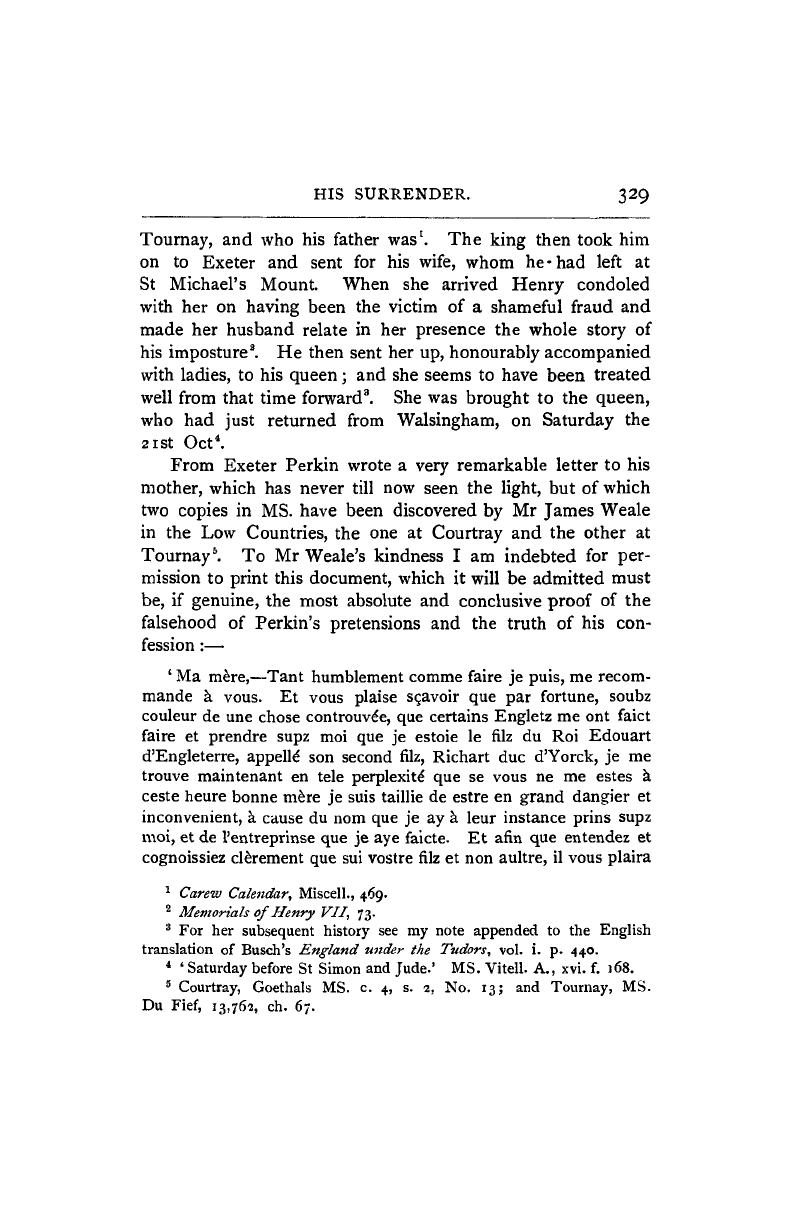
HIS SURRENDER. 329
Tournay, and who his father was
1
. The king then took him
on to Exeter and sent for his wife, whom he- had left at
St Michael's Mount. When she arrived Henry condoled
with her on having been the victim of a shameful fraud and
made her husband relate in her presence the whole story of
his imposture
3
. He then sent her up, honourably accompanied
with ladies, to his queen; and she seems to have been treated
well from that time forward
3
. She was brought to the queen,
who had just returned from Walsingham, on Saturday the
21st Oct
4
.
From Exeter Perkin wrote a very remarkable letter to his
mother, which has never till now seen the light, but of which
two copies in MS. have been discovered by Mr James Weale
in the Low Countries, the one at Courtray and the other at
Tournay
6
. To Mr Weale's kindness I am indebted for per-
mission to print this document, which it will be admitted must
be,
if genuine, the most absolute and conclusive proof of the
falsehood of Perkin's pretensions and the truth of his con-
fession :—
' Ma mere,—Tant humblement comme faire je puis, me recom-
mande a vous. Et vous plaise sgavoir que par fortune, soubz
couleur de une chose controuve"e, que certains Engletz me ont faict
faire et prendre supz moi que je estoie le filz du Roi Edouart
d'Engleterre, appelle" son second filz, Richart due d'Yorck, je me
trouve maintenant en tele perplexity que se vous ne me estes a
ceste heure bonne mere je suis taillie de estre en grand dangier et
inconvenient, a cause du nom que je ay a leur instance prins supz
moi,
et de l'entreprinse que je aye faicte. Et afin que entendez et
cognoissiez clerement que sui vostre
filz
et non aultre, il vous plaira
1
Carew Calendar, Miscell., 469.
2
Memorials of Henry VII, 73.
3
For her subsequent history see my note appended to the English
translation of Busch's England under the Tudors, vol. i. p. 440.
4
' Saturday before St Simon and Jude.' MS. Vitell. A., xvi. f. 168.
6
Courtray, Goethals MS. c. 4, s. 2, No. 13; and Tournay, MS.
Du
Fief,
13,762, ch. 67.
